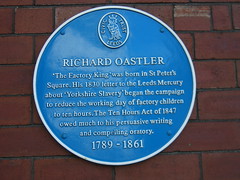Richard Oastler
Commemorated on 1 plaque
Richard Oastler 'The Factory King' was born in St Peter's Square. His 1830 letter to the Leeds Mercury about 'Yorkshire Slavery' began the campaign to reduce the working day of factory children to ten hours. The Ten Hours Act of 1847 owed much to his persuasive writing and compelling oratory. 1789 - 1861
The Wardrobe, St Peters Square (by BBC North HQ), Leeds, United Kingdom where they was born (1789)


